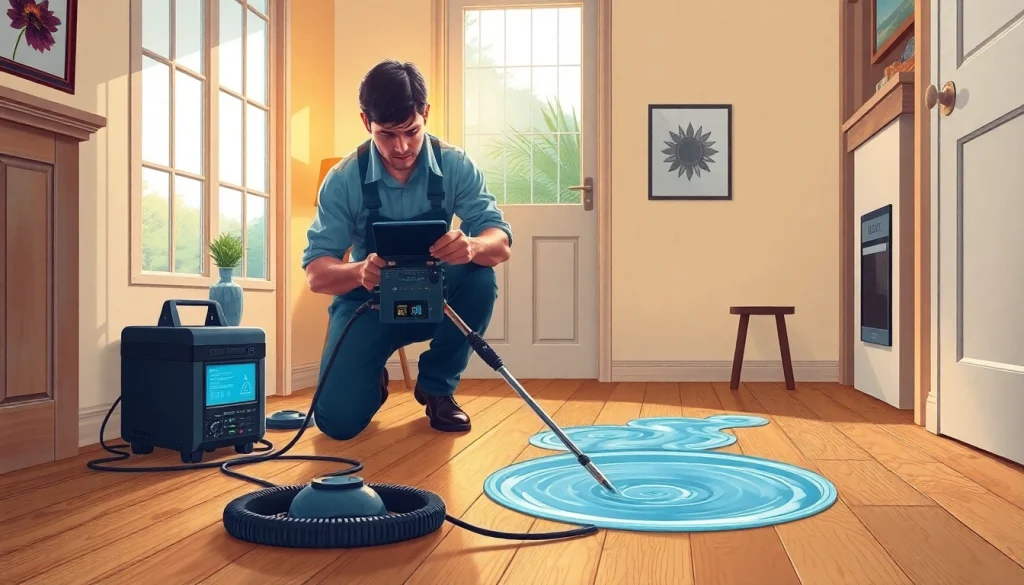
Understanding the Importance of Leak Detection Cornwall
Leak detection is a critical aspect of home and business maintenance that often goes unnoticed until a significant issue arises. Addressing leaks promptly not only prevents damage to properties but also saves considerable amounts of money in repairs and water bills. As residents of Cornwall increasingly understand the importance of maintaining their plumbing systems, Leak Detection Cornwall has emerged as a vital service for homeowners and businesses alike.
What is Leak Detection Cornwall?
Leak detection refers to the various methods and technologies used to identify and locate leaks within plumbing systems, irrigation setups, and other water-related infrastructure. In Cornwall, specific geographical and environmental factors make professional leak detection services essential to avoid water damage, which can escalate quickly in coastal regions. These services utilize advanced techniques to pinpoint leak sources, enabling effective and timely repairs.
Common Types of Leaks in Residential Areas
Residential properties in Cornwall are susceptible to various types of leaks, including:
- Slab Leaks: These occur when pipes installed under concrete foundations crack or break, often unnoticed until significant damage is obvious.
- Roof Leaks: Common in older homes, these leaks can arise from damaged shingles or flashing, leading to water intrusion during rain.
- Waterline Leaks: Underground water supply lines can develop leaks due to corrosion or ground movement, which may not be visible until they cause puddling or flooding.
- Drainage Leaks: Issues with waste pipes can lead to unpleasant smells and property damage, particularly in areas with heavy usage like kitchens and bathrooms.
How Leak Detection Saves You Money
Investing in leak detection services can have a profound impact on a homeowner’s finances. Here are several ways that effective leak detection can lead to savings:
- Reduced Water Bills: Untreated leaks can result in substantial increases in water bills. Detecting and repairing leaks quickly mitigates this financial burden.
- Protection Against Structural Damage: Water damage from leaks can compromise the integrity of a structure, resulting in expensive repairs. Early detection prevents such issues.
- Lower Mold Risks: Mold growth due to leaks can lead to health issues and high remediation costs. Timely leak detection minimizes the risk of mold proliferation.
- Enhanced Property Value: Well-maintained properties with a history of proactive leak management typically have higher resale values.
Recognizing the Signs of a Leak
Visible Water Damage: What to Look For
One of the most evident signs of a leak is visible water damage. Homeowners should regularly inspect areas such as:
- Ceilings and Walls: Look for discoloration, peeling paint, and bubbling wallpaper.
- Floors: Warped or buckled flooring can indicate underlying water issues.
- Basements: Damp walls or puddles in basements are often a sign of leaks.
Unexplained Increases in Water Bills
If you notice a consistent increase in your water bills without a corresponding increase in usage, it may indicate a hidden leak within your system. Monitoring your bills regularly can help detect such changes early.
Sounds of Running Water: A Hidden Leak Indicator
Strange sounds of running water when no taps are open can be a strong indication of a leak. Homeowners should pay attention to any unusual noises from walls, floors, or ceilings that may suggest a leaky pipe.
Methods Used in Leak Detection Cornwall
Non-Invasive Technologies: How They Work
Modern leak detection employs non-invasive technologies that minimize damage to the property during the inspection process. Techniques can include:
- Moisture Meters: These devices detect moisture levels in walls and floors to find hidden leaks.
- Thermal Imaging: Infrared cameras reveal temperature variations caused by water presence, effectively identifying leak locations.
- Video Inspection: Cameras are sent into pipes to visualize leak sites without needing extensive excavation.
Infrared Thermography in Leak Detection
Infrared thermography detects heat emitted from objects, enabling technicians to identify temperature differentials caused by leaks. This method is invaluable for spotting leaks in walls and ceilings, particularly in inaccessible areas. The ability to visualize temperature changes can prevent costly exploratory excavation work.
Acoustic Leak Detection Techniques
Acoustic leak detection involves the use of sound to locate leaks. This method relies on listening for the sounds of water escaping from pipes. Specialized equipment can amplify these sounds, allowing technicians to identify leak locations accurately. This method is particularly effective for underground or concealed piping systems.
Choosing the Right Leak Detection Professionals
What Qualifications to Look For
When selecting a leak detection service in Cornwall, it’s crucial to consider the qualifications and experience of the professionals:
- Certification: Ensure technicians are certified and trained in leak detection methodologies.
- Experience: Look for companies with a proven track record of successful leak detection in residential and commercial properties.
- Insurance: Verify that the service provider holds adequate insurance to protect against any accidental damages during their work.
Questions to Ask a Leak Detection Service
Before hiring a leak detection service, consider asking the following questions:
- What techniques and technologies do you use for leak detection?
- Can you provide references from past clients?
- What is your service guarantee or warranty?
- How do you handle repairs following leak detection?
The Importance of Customer Reviews and Testimonials
Customer testimonials can provide deep insights into a leak detection service’s reliability and effectiveness. Reading reviews on various platforms can help you gauge the experiences of previous clients and their satisfaction levels. Positive reviews and detailed testimonials often indicate a trustworthy service provider.
Preventative Measures and Maintenance Tips
Regular Inspections to Prevent Water Damage
One of the best ways to mitigate potential leak issues is to conduct regular inspections of your plumbing systems. Homeowners should schedule professional inspections at least annually and perform visual checks themselves, particularly after harsh weather events.
Understanding Your Plumbing System
Familiarizing yourself with the layout of your plumbing system can help you recognize early signs of leaks. Know where pipes and connections are located, as well as any vulnerable areas that may be susceptible to damage in severe weather or temperature fluctuations.
Investing in Leak Detection Technology for Homeowners
Investing in leak detection technology, such as smart water sensors, can provide peace of mind. These devices alert homeowners to leaks or changes in water flow, allowing for prompt action before significant damage occurs. Such proactive measures can save time and money, ensuring that your home remains safe and dry.






